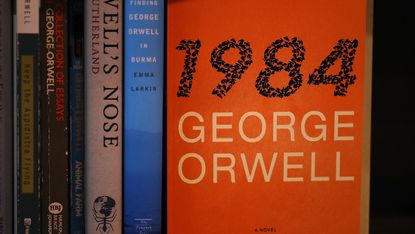Book of the week: Orwell’s Roses by Rebecca Solnit
This curious, meandering book restores ‘something missing’ from the popular perception of Orwell

George Orwell is often presented as a “rather dour and austere figure”, said Gaby Hinsliff in The Observer – a chronicler of hardship and a “prophet of doom”. But according to the American essayist Rebecca Solnit, there was a softer side to the author – which expressed itself in his love of gardening.
Orwell’s Roses begins with Solnit visiting the Hertfordshire village where Orwell lived between 1936 and 1940, in a rented cottage. In its garden, she finds two vigorously flowering rose bushes, which she assumes to be the ones he recorded planting in his diary. The book that “blooms” from this discovery covers many topics: the influence on Orwell of the English pastoral; the symbolism of the rose in art and literature; the working conditions at the South American rose farms that supply us with “cheap blooms” today. It’s a curious, meandering book – one that “belongs in a whimsical category of its own” – but it does restore “something missing” from the popular perception of Orwell.
Previous commentators haven’t generally dwelled on Orwell’s horticultural leanings, said Rupert Christiansen in The Daily Telegraph. But Solnit – best known for her witty 2008 essay Men Explain Things to Me, which gave rise to the term “mansplaining” – mounts a surprisingly persuasive case that Orwell’s interest in gardening offers a kind of key to understanding his work.
Subscribe to The Week
Escape your echo chamber. Get the facts behind the news, plus analysis from multiple perspectives.

Sign up for The Week's Free Newsletters
From our morning news briefing to a weekly Good News Newsletter, get the best of The Week delivered directly to your inbox.
From our morning news briefing to a weekly Good News Newsletter, get the best of The Week delivered directly to your inbox.
She stresses that he was drawn to homely things: rusticity, artisanal traditions, a “properly brewed cup of tea”. Much of the honesty of his writing, she argues, grew out of this engagement with the physical world. And she connects it to the sense of hope that flourished in all his work, alongside the more familiar “Orwellian” warnings about oppression, totalitarianism and state surveillance.
Like Solnit, Orwell was an insatiably curious essayist with a “penchant for digressions and tangents”, said Heller McAlpin in the Los Angeles Times. But while she clearly sees him as a kindred spirit, she doesn’t ignore what she calls his “significant blind spots” – most notably his rather dismissive attitude towards women, which manifested in his failure to review books by female writers.
She also stresses that though he criticised imperialism, he himself was its beneficiary: he was “descended from colonialists and servants of empire”, and his father was an opium producer in India. Overall, Solnit “leaves no row unhoed” in this impressive reassessment of one of our greatest writers. From its “beautiful cover to its impassioned coda”, it is “one of her very best” books.
Granta 320pp £16.99; The Week Bookshop £13.99

The Week Bookshop
To order this title or any other book in print, visit theweekbookshop.co.uk, or speak to a bookseller on 020-3176 3835. Opening times: Monday to Saturday 9am-5.30pm and Sunday 10am-4pm.
Create an account with the same email registered to your subscription to unlock access.
Sign up for Today's Best Articles in your inbox
A free daily email with the biggest news stories of the day – and the best features from TheWeek.com
-
 Nigeria's worsening rate of maternal mortality
Nigeria's worsening rate of maternal mortalityUnder the radar Economic crisis is making hospitals unaffordable, with women increasingly not receiving the care they need
By Harriet Marsden, The Week UK Published
-
 'Elevating Earth Day into a national holiday is not radical — it's practical'
'Elevating Earth Day into a national holiday is not radical — it's practical'Instant Opinion Opinion, comment and editorials of the day
By Harold Maass, The Week US Published
-
 UAW scores historic win in South at VW plant
UAW scores historic win in South at VW plantSpeed Read Volkswagen workers in Tennessee have voted to join the United Auto Workers union
By Peter Weber, The Week US Published
-
 6 serene homes in Vermont
6 serene homes in VermontFeatures Featuring a four-level Shaker barn in Hartland and a Scandinavian-inspired home in Stowe
By The Week US Published
-
 Amanda Montell's 6 favorite books that will expand your knowledge
Amanda Montell's 6 favorite books that will expand your knowledgeFeature The linguist recommends works by Mary Roach, Alice Carrière, and more
By The Week US Published
-
 Rowan Beaird recommends 6 compelling books from the 1950s
Rowan Beaird recommends 6 compelling books from the 1950sFeature The author recommends works by Patricia Highsmith, Shirley Jackson, and more
By The Week US Published
-
 6 spacious homes with great rec rooms
6 spacious homes with great rec roomsFeature Featuring a suspended fireplace in Arizona and a marine-themed home in Maine
By The Week Published
-
 Recipe: gnocchi di spinaci (spinach gnocchi)
Recipe: gnocchi di spinaci (spinach gnocchi)The Week Recommends Forget the potatoes for this gnocchi made of the 'classic combination' of spinach and ricotta
By The Week UK Published
-
 Stephen Graham Jones' 6 scary books with deeper meanings
Stephen Graham Jones' 6 scary books with deeper meaningsFeature The best-selling author recommends works by Stephen King, Sara Gran, and more
By The Week US Published
-
 6 stylish homes on the top floor
6 stylish homes on the top floorFeature Featuring a 1925 art deco high-rise in San Francisco and a factory-turned-home in Los Angeles
By The Week US Published
-
 The Anxious Generation: US psychologist Jonathan Haidt's 'urgent and essential' new book
The Anxious Generation: US psychologist Jonathan Haidt's 'urgent and essential' new bookThe Week Recommends Haidt calls out 'the Great Rewiring of Childhood' phenomenon
By The Week UK Published